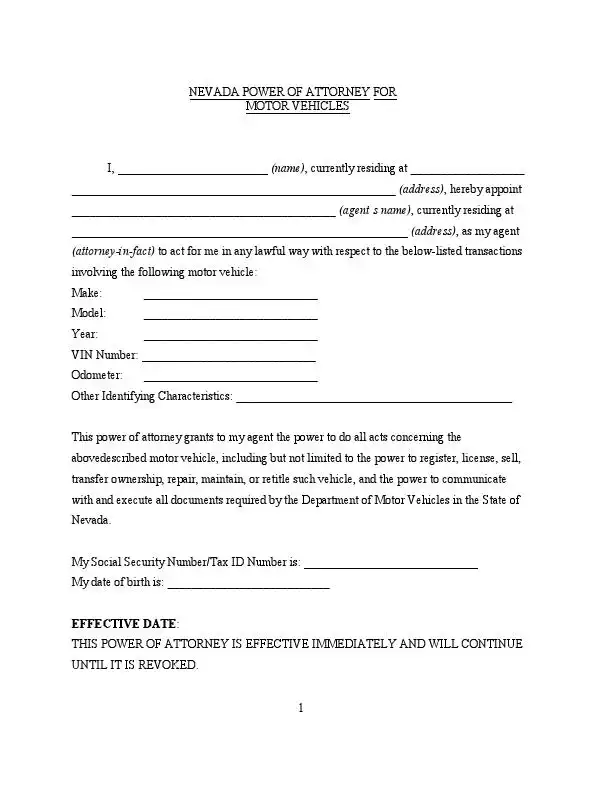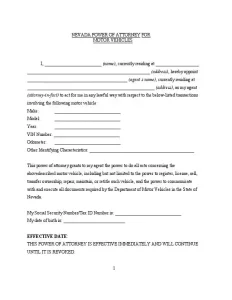Nevada Motor Vehicle Power of Attorney Form
The Nevada vehicle power of attorney (POA) allows an individual, known as the principal, to designate another person, referred to as the agent or attorney-in-fact, to handle matters related to the ownership, registration, and other transactions of motor vehicles on their behalf. The POA must be in writing and include the VIN, make, model, and year of the vehicle. It also must be signed by the principal and acknowledged before a notary public to be considered valid.

Build Your Document
Answer a few simple questions to make your document in minutes
Save and Print
Save progress and finish on any device, download and print anytime
Sign and Use
Your valid, lawyer-approved document is ready
Section 482.415 of the Nevada Revised Statutes (NRS) includes provisions pertinent to the Motor Vehicle Power of Attorney. Specifically, the statute allows certain actions when an applicant for vehicle registration cannot produce the necessary certificate of registration or title due to loss or unlawful detention.
The Nevada Department of Motor Vehicles (DMV) also provides a standard Form VP136. This document meets all the legal requirements and helps simplify the process for residents. Using the state-provided power of attorney template helps prevent common mistakes and ensures compliance with all relevant laws. You can also get all Nevada POA forms on our site.
Nevada Motor Vehicle Power of Attorney Form Details
| Document Name | Nevada Motor Vehicle Power of Attorney Form |
| State Form Name | Form VP136 |
| Relevant Link | Nevada Department of Motor Vehicles |
| Avg. Time to Fill Out | 10 minutes |
| # of Fillable Fields | 26 |
| Available Formats | Adobe PDF |
Filling Out Nevada Vehicle POA
To legally authorize someone else to handle your vehicle-related affairs in Nevada, you must fill out the Nevada Form VP136, the motor vehicle power of attorney. This form is designed to delegate authority for signing documents related to vehicle registration, title transfers, and other related DMV transactions.
1. Provide Your Information
Start by entering your full legal name and address details. Specify your first, middle, and last name as it appears on your legal documents. Include your physical and mailing addresses, ensuring they are complete and accurate.
2. Enter Vehicle Details
Detail the vehicle associated with this power of attorney. Include the vehicle’s year, make, model, and VIN. This information must be precise to ensure the power of attorney is correctly linked to the specific vehicle.
3. Designate Your Attorney-in-Fact
Identify the person you are appointing as your attorney-in-fact. Provide their full legal name and address. This individual will be authorized to act on your behalf in vehicle-related matters, so ensure you trust them with this responsibility.
4. Specify Powers Granted
Clearly outline the scope of powers you are granting to your attorney-in-fact. This step typically includes signing documents necessary for transferring the vehicle’s registration or title. Be explicit about what your attorney-in-fact can and cannot do.
5. Include Identification Details
Add your Nevada Driver’s License, Identification Card Number, or FEIN (if it’s for a business) and your date of birth. This information helps the DMV verify your identity and that of your attorney-in-fact.
6. Sign and Notarize the Form
The form must be signed in the presence of a notary public or an authorized Nevada DMV representative. Your signature must be original, as photocopies are not accepted. Ensure the form is not altered after it is signed and witnessed.
7. Submit the Form
Once completed and notarized, submit the form to the Nevada DMV. Check if there are any specific submission instructions or if additional documentation is required.
